Liliana Morais ✿ A barefoot scholar between Brazil and Japan
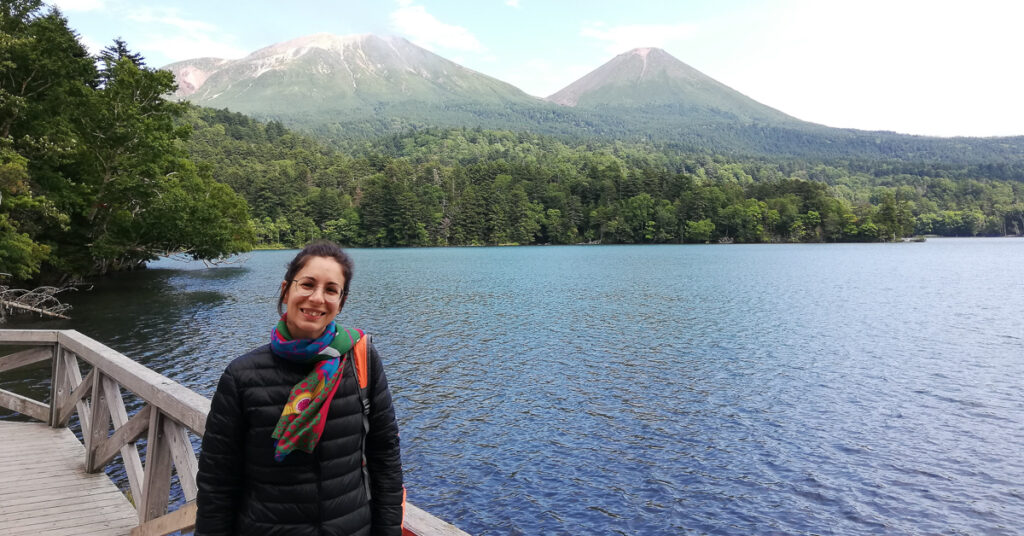
Liliana Morais offers a humanist perspective on Japanese craft, where she finds a joyfully made beauty.
Born in Portugal, Liliana Morais holds a B.A. in Archaeology and History from the University of Lisbon (2007), an M.A. in Japanese Culture from the University of São Paulo (2014), and a PhD in Sociology from Tokyo Metropolitan University (2019). She is currently an Adjunct Professor at various universities around Japan. She was a curator of the exhibition From Japan to Brazil: the Voyage of Oriental Ceramics, held at Caixa Cultural Salvador. In 2014-5, she worked as a research collaborator at the Cunha Ceramics Cultural Institute, where she published the book Cunha Ceramics: 40 years of Noborigama kiln in Brazil (ICCC, 2016, in Portuguese). As a researcher, she is interested in looking at art and material culture through the lens of mobility, transnational migration, and transcultural exchanges. Her scholarly work is based on qualitative research methods such as ethnographic fieldwork, participant observation, and oral history. Follow @portugalbrasiljapao
Liliana Morais talks about her inspiration:
When writing a story, I look for connections between people, time, and places. Because of my interdisciplinary background and my transnational experience within three continents, I tend to stress the human and universal aspects found in specific and local stories.
I am inspired by the writings of Richard Sennett, Tim Ingold, David Pye, Glenn Adamson, Yuko Kikuchi, and others who have written about the predicament of crafts in modernity and the complex entanglements between people, matter, and environment. Talking directly with makers and witnessing the pleasure and sheer joy they emanate when speaking about and engaging with their media, tools and materials is my richest source of inspiration. More than the finished object itself, I am interested in people’s stories and the social relationships that objects, materials, and places galvanize.
I live in Tokyo, one of the largest metropolises in the world, surrounded by a tall concrete “jungle”. Because of this and due to the nature of my work as an academic (which entails long hours sitting in front of a computer), I often crave simple and primal material connections, like walking barefoot on grass or listening to the sound of the water flowing. In the search for those connections, I engage haptically with handmade objects in my day-to-day life, appreciate ancient and contemporary crafts in the many Tokyo galleries and museums, or immerse myself in the deep mountains and riverbanks of the Japanese countryside whenever I have the chance.
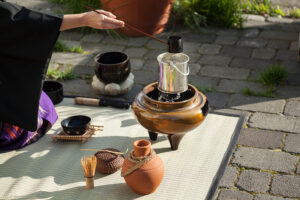 Introduction: A taste of the world - Liliana Morais introduces the Taste-Makers issue, whose stories reflect the sense of place, gustatory experience of objects and ways of coming together.
Introduction: A taste of the world - Liliana Morais introduces the Taste-Makers issue, whose stories reflect the sense of place, gustatory experience of objects and ways of coming together. 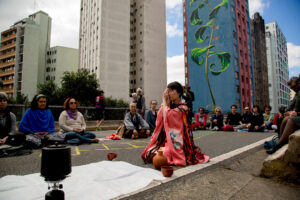 Erika Kobayashi ✿ A tea ceremony for Brazil - Liliana Morais interviews Brazilian performer Erika Kobayashi about how she updates the Japanese tea ceremony to suit the pulse of life in Brazil.
Erika Kobayashi ✿ A tea ceremony for Brazil - Liliana Morais interviews Brazilian performer Erika Kobayashi about how she updates the Japanese tea ceremony to suit the pulse of life in Brazil.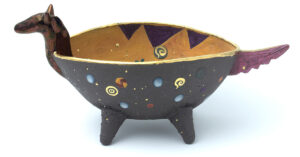 Imagining a nostalgic future: The cosmic ceramics of Douglas Black - Liliana Morais explores the world of a US-born ceramicist who gives expression to planetarity from his self-built house in the mountains of Japan.
Imagining a nostalgic future: The cosmic ceramics of Douglas Black - Liliana Morais explores the world of a US-born ceramicist who gives expression to planetarity from his self-built house in the mountains of Japan. Let’s go back to the campfire: The lesson of mingei - Liliana Morais looks critically at the decline of mingei and argues for a stronger social context for craft.
Let’s go back to the campfire: The lesson of mingei - Liliana Morais looks critically at the decline of mingei and argues for a stronger social context for craft.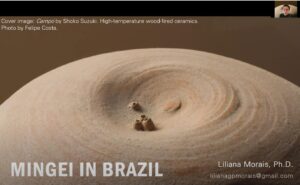 The spirit of Japanese mingei in Brazil - Our Reinventing the Wheel series considers the evolution of Japanese craft traditions in Brazil, as documented by Liliana Morais and Silvia Sasaoka.
The spirit of Japanese mingei in Brazil - Our Reinventing the Wheel series considers the evolution of Japanese craft traditions in Brazil, as documented by Liliana Morais and Silvia Sasaoka.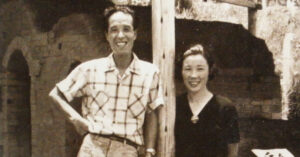 From Japan to Brazil: The ceramics of Shoko Suzuki - Liliana Morais follows a Japanese ceramicist who built a kiln in order to make a life between Japan and Brazil.
From Japan to Brazil: The ceramics of Shoko Suzuki - Liliana Morais follows a Japanese ceramicist who built a kiln in order to make a life between Japan and Brazil.
✿
Liliana Morais is an esteemed Garland perennial.
